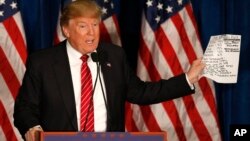Republican presidential front-runner Donald Trump acknowledged on Tuesday he did not yet have a foreign policy team and dismissed criticism that his harsh rhetoric on immigration and threats to gut global trade deals would damage America's standing on the world stage.
The New York billionaire, who had promised to name his foreign policy and national security advisers last month, told MSNBC that he has met with people but made no decision yet on who to advise him on global affairs.
Trump told a Feb. 17 town hall event hosted by the network that he would name his advisers the following week, and last week said the list would come in another week or two.
'There is a team'
Asked whether he had a team, Trump said on Tuesday: "Yes, there is a team. Well, there's not a team. I'm going to be forming a team at the appropriate time. I've met with far more than three people."
Foreign diplomats from Europe, the Middle East, Latin America and Asia have expressed alarm to U.S. government officials about Trump, calling his public statements inflammatory and insulting.
The former reality television star shot back, saying diplomats are upset over his tough stance on trade and his promises to return jobs to the United States as he seeks the party's nomination for the Nov. 8 presidential election.
"Every country is ripping us off in trade, and other things. And they know that won't happen with me. I'm going to bring trade back, I'm going to bring our jobs back," Trump told Fox News. "I'm bringing it all back, and obviously they're not that happy about it."
Campaign themes
He has centered his campaign on illegal immigration, jobs and trade, criticizing China, Japan and Mexico, among others, and pointing to his business background as evidence he can negotiate with other countries.
Trump has said he relies mostly on his own thoughts to determine his foreign policy stance.
On Tuesday, Trump pointed to U.S. Senator Jeff Sessions, who recently endorsed him, as someone he would consider for his team, adding that he would make a decision "in due time."
Sessions is not known as one of the party's leading foreign policy voices in the Senate. He opposes comprehensive immigration reform and supports tight border security measures.
Trump has also announced endorsements from two foreign policy figures: former senior CIA officer Gary Berntsen, who was involved in major operations in Afghanistan after the September 11, 2001 attacks, and retired military officer Jim Waurishuk.
JD Gordon, a former military officer and Pentagon spokesman, also supports Trump, according to The Hill newspaper.
Rival's national security team
On Monday, rival Marco Rubio released his national security team. The U.S. senator's list includes "neoconservatives" such as former Deputy National Security Advisor Elliott Abrams and former Under Secretary of Defense Eric Edelman.
Ted Cruz, the U.S. senator from Texas also battling for the Republican nomination, has enlisted Victoria Coates, an art historian and author who previously worked for former Secretary of Defense Donald Rumsfeld, as his top foreign policy adviser.
Ohio Governor John Kasich, another rival, has named 33 national security advisers, including former National Security Advisor Richard Allen, who served under President Ronald Reagan.
On the Democratic side, U.S. Senator Bernie Sanders of Vermont has tapped Bill French, a policy analyst at the National Security Network, to pull together outside advisers on such issues, Foreign Policy magazine reported.
The campaign for Democratic front-runner Hillary Clinton, former secretary of state, has said her foreign policy team includes several hundred advisers, according to the magazine.
Trump and Clinton look to build on their leads in the presidential nominating races when four states vote on Tuesday, and polls show them comfortably ahead in the biggest prize of Michigan.





